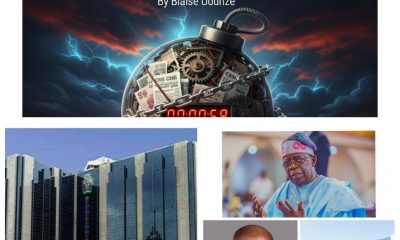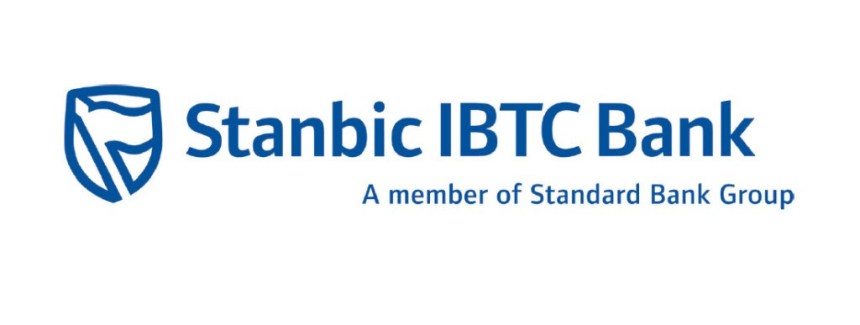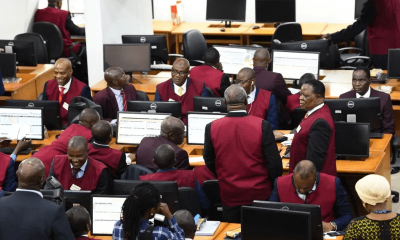Economy
DMO Mulls Introduction of More Fixed Income Securities

By Modupe Gbadeyanka
In order to give investors more room to grow their wealth through investment in different financial tools, the Debt Management Office (DMO) is considering introducing more sophisticated debt instruments into the fixed income market in Nigeria.
The Director-General of the agency, Ms Patience Oniha, dropped this hint during a two-day webinar to enlighten stockbrokers and investors about the fixed income market.
On Wednesday, the event primarily focused on the dealing member firms, while Thursday was for members of the investing public.
The programme was put together by the Nigerian Stock Exchange (NSE) in partnership with the DMO and CSL Stockbrokers. It was mainly to further enhance the capacity of capital market players across available asset classes.
Ms Oniha in her presentation said her organisation remains responsive to investors’ needs for portfolio diversification, noting that this has spurred the urge to expand “our fixed income market with more sophisticated debt instruments.”
According to her, the market in Nigeria is capable of attracting both domestic and international players for the overall good of the economy, saying this has led to the growth and activeness of the space, giving room for the government, corporates and multilaterals to raise funds.
She expressed satisfaction with the way the fixed income market has become viable like the money market and the capital market.
Ms Oniha said “in meeting our objectives to finance the budget and deepen capital market activity, we remain committed to using the fixed income platform to support various aspects of the economy.”
The CEO of the NSE, Mr Oscar Onyema, while speaking at the webinar, said the exchange has continued to provide a hybrid market for dealers as well as institutional and retail investors to access increased liquidity in fixed income securities.
He noted that, “The NSE continues to be the foremost platform creating new types of debt instruments in Nigeria with a market capitalisation of about N16.4 trillion.”
“By offering capital raising opportunities and secondary trading to all classes of issuers including sovereign, subnational, corporates and supra-national bonds, the exchange facilitates the interaction between borrowers and lenders in Nigeria, driving an efficient allocation of capital.”
In his presentation, the Equity Analyst at CSL Stockbrokers, Mr Olakayode Olayemi, taught participants the fundamentals of fixed income trading, highlighting the primary and secondary market activities, as well as the investment opportunities and benefits available for investors in the NSE debt market.
Economy
Customs to Fast-Track Cargo Clearance at Lekki Deep Sea Port

By Adedapo Adesanya
The Comptroller-General of the Nigeria Customs Service (NCS), Mr Adewale Adeniyi, has unveiled a Green Channel initiative at the Lekki Deep Sea Port as part of efforts to simplify cargo clearance, reduce delays, and improve operational efficiency for port users.
The launch marks a major step in customs’ drive to enhance trade facilitation through technology and stakeholder collaboration.
Speaking at the event in Lagos, Mr Adeniyi said the initiative was introduced by the Lekki Deep Sea Port and approved by NCS management to address persistent challenges in container stacking and examination at major ports, which often slow cargo processing.
“This particular intervention helps to move containers right from the vessel into a dedicated place where customers can have access. And between the time the container moves from the vessel to this particular place, it is tracked,” he said.
The customs boss explained that the Green Channel is designed to ensure seamless cargo movement through a dedicated corridor with minimal bureaucratic obstacles, enabling faster turnaround time for importers and other stakeholders.
He described the initiative as a product of mutual trust between the agency and its stakeholders, stressing that compliance and cooperation are essential to its success.
“What we have done today is a product of the kind of trust that we have invested in our stakeholders and the confidence that we also have in them, that they would do this in the spirit of compliance and trade facilitation,” he said.
Mr Adeniyi added that beyond easing port operations, the Green Channel supports Nigeria’s broader economic objective of building a more competitive trade environment, noting that the initiative is expected to reduce the cost and time required to do business, ultimately boosting revenue generation for the service.
Economy
Jim Ovia Denies Knowledge of Wealth Bridge Investment Scheme

By Aduragbemi Omiyale
The chairman of Zenith Bank Plc, Mr Jim Ovia, has dissociated himself from a video making the rounds, purporting that he has endorsed an investment scheme put together by Wealth Bridge.
In a statement, it was emphasised that the video of the businessman is fake, as he has no link with Wealth Bridge, which urged Nigerians to invest in the business.
The management of Zenith Bank has, therefore, advised the public to disregard videos circulated through the Greece Island Facebook handle.
The promoters of the investment scheme promised prospective customers up to N2 million in weekly returns on a contribution of N380,000.
But Zenith Bank stressed that any member of the public who conducts business with the entity does so at his or her risk, as claims in the video that the investment has the backing of the Central Bank of Nigeria (CBN) are untrue.
“The video redirects unsuspecting members of the public to an alleged Arise News webpage with the details of this scheme and an embedded registration portal for signups. This claim is also entirely false and has no connection whatsoever to the bank or its group chairman.
“For the avoidance of doubt, all the videos and promotional materials referenced above are FAKE and have nothing to do with Zenith Bank Plc or Dr Jim Ovia. The Group Chairman of Zenith Bank and the bank have no knowledge of the said investment scheme and have not entered into any partnership with the companies, individuals, or platforms behind these schemes.
“The general public is hereby advised to disregard these fraudulent communications. Anyone who engages with the Greece Island handle, Wealth Bridge, delicious sitee, AfriQuantumX, Stock market analyst 1, or any other entity on the basis of these fake videos and images published by impostors does so strictly at his or her own risk,” parts of the statement read.
Economy
FG to Review Six-Month Shea Export Ban

By Adedapo Adesanya
The federal government has assured stakeholders in the shea value chain that it would review the export ban on shea nuts, citing concerns over its impact on local producers, exporters and foreign exchange (FX) earnings.
On August 26, 2025, President Bola Tinubu directed a six-month temporary ban on the export of raw shea nuts.
According to NAN, the Minister of Industry, Trade and Investment, Mrs Jumoke Oduwole, at a stakeholders’ validation session on the ban on raw shea nuts exports in Nigeria on Thursday, said the ministry would brief the president after consultations across the value chain.
The Minister, at the gathering in Abuja, said the government recognises the right of citizens to earn a living and contribute to national development, adding that all inputs from stakeholders would be carefully reviewed and consolidated.
“All inputs from stakeholders will be carefully reviewed and consolidated before a decision is made on whether the ban should be extended immediately or deferred,” the Minister said, adding that, “The ministry will provide the president with factual and balanced information to guide further action.”
Mrs Oduwole said the ministry engaged widely with stakeholders to ensure all perspectives were considered in the ongoing policy deliberations.
The ministry, she said, received formal submissions from the umbrella association and held engagement sessions attended by various industry representatives.
The minister said the submissions were reproduced and circulated at the meeting to promote transparency and shared understanding.
“Relevant departments within the ministry worked jointly on the matter, and I personally reviewed the submissions to assess our position ahead of broader consultations,” she said.
In his remarks, the Minister of Agriculture and Food Security, Mr Abubakar Kyari, said the meeting was convened to review the ban objectively, underscoring the need for verified facts and transparency.
Mr Kyari said government decisions intend to protect jobs and encourage local value addition, adding that policies should be assessed holistically based on evidence and measurable impact.
Rationalising the ban last August, the Vice President, Mr Kashim Shettima, said while Nigeria produces nearly 40 per cent of the global Shea product, it accounts for only 1 per cent of the market share of $6.5 billion.
“This is unacceptable. We are projected to earn about $300 million annually in the short term, and by 2027, there will be a 10-fold increase. This is our target,” the VP stated.
He explained that the ban was a collective decision involving the sub-nationals and the federal government with clear directions for economic transformation in the overall interest of the nation, stressing that the “government is not closing doors; we are opening opportunities.”
-

 Feature/OPED6 years ago
Feature/OPED6 years agoDavos was Different this year
-
Travel/Tourism10 years ago
Lagos Seals Western Lodge Hotel In Ikorodu
-

 Showbiz3 years ago
Showbiz3 years agoEstranged Lover Releases Videos of Empress Njamah Bathing
-

 Banking8 years ago
Banking8 years agoSort Codes of GTBank Branches in Nigeria
-

 Economy3 years ago
Economy3 years agoSubsidy Removal: CNG at N130 Per Litre Cheaper Than Petrol—IPMAN
-

 Banking3 years ago
Banking3 years agoSort Codes of UBA Branches in Nigeria
-

 Banking3 years ago
Banking3 years agoFirst Bank Announces Planned Downtime
-

 Sports3 years ago
Sports3 years agoHighest Paid Nigerian Footballer – How Much Do Nigerian Footballers Earn



















